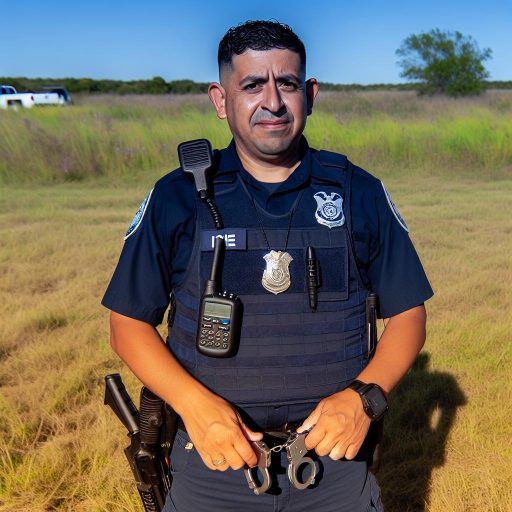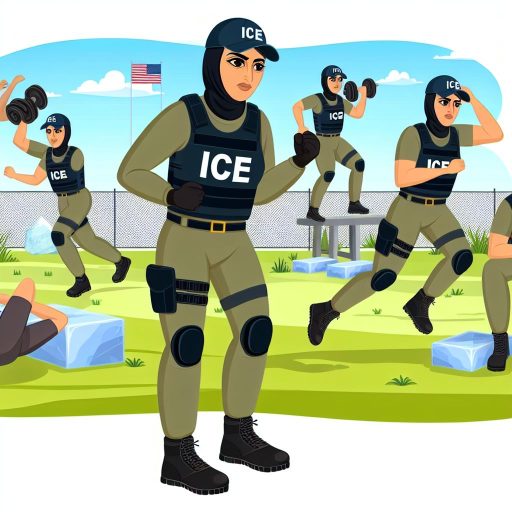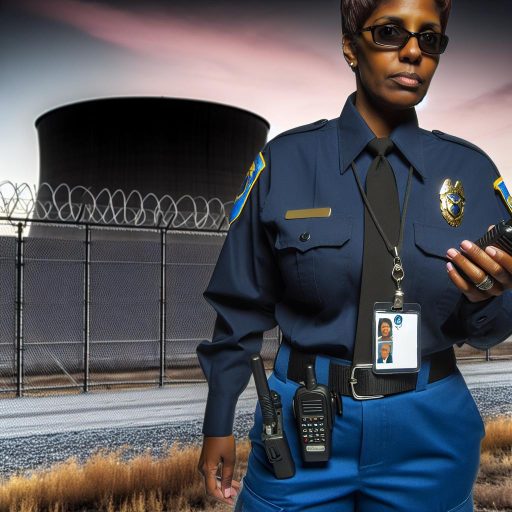Introduction:
U.S. Marshals are federal law enforcement officers responsible for protecting the judicial system.
They play a crucial role in ensuring the safety and security of court proceedings.
Roles and Responsibilities of U.S. Marshals
1. Transporting and Custody:
U.S. Marshals transport federal prisoners to and from court appearances.
They also ensure the safety and security of these individuals while in custody.
2. Fugitive Apprehension:
One of the most well-known roles of U.S. Marshals is tracking down and apprehending fugitives.
They work tirelessly to bring individuals who have violated federal laws to justice.
3. Witness Security:
U.S. Marshals are responsible for protecting witnesses who are at risk due to their involvement in court cases.
They ensure the safety of these individuals and their families at all times.
4. Judicial Security:
Another important responsibility of U.S. Marshals is providing security for the federal judiciary.
They protect judges, jurors, and other court personnel from potential threats.
5. Asset Seizure:
U.S. Marshals also play a key role in seizing assets from individuals involved in criminal activities.
They ensure that these assets are properly secured and managed.
6. Special Operations:
In addition to their regular duties, U.S. Marshals participate in special operations to address specific threats.
They work collaboratively with other law enforcement agencies to ensure public safety.
Transform Your Career Today
Unlock a personalized career strategy that drives real results. Get tailored advice and a roadmap designed just for you.
Start NowU.S. Marshals play a vital role in upholding the integrity of the judicial system and maintaining law and order in our society.
History of U.S. Marshals:
The origins of the U.S. Marshals date back to 1789.
Initially, they served as enforcers for the federal courts.
Over time, their role evolved to include fugitive apprehension and prisoner transport.
The U.S. Marshals played a crucial role in maintaining law and order in the expanding country.
With the passage of the Judiciary Act of 1789, the U.S. Marshals Service was established.
They were tasked with ensuring the proper functioning of the federal judiciary.
U.S. Marshals were responsible for serving court orders and subpoenas.
Their duties expanded to include the protection of federal witnesses and judges.
During the Civil War, U.S. Marshals were involved in enforcing loyalty oaths and hunting down deserters.
In the 20th century, U.S. Marshals took on the responsibility of protecting the civil rights of African Americans.
U.S. Marshals conducted high-profile operations such as capturing fugitives like Bonnie and Clyde.
Today, the U.S. Marshals Service is the oldest federal law enforcement agency in the United States.
The agency has a rich history of upholding justice and protecting the rights of American citizens.
U.S. Marshals Operations
U.S. Marshals play a crucial role in upholding the law and ensuring justice is served throughout the country.
Let’s delve into the specific responsibilities that U.S. Marshals undertake in their daily operations.
Fugitive Apprehension and Transport
U.S. Marshals are responsible for tracking down and apprehending fugitives who have eluded law enforcement authorities.
This task requires a combination of investigative skills, strategic planning, and tactical execution to ensure the safe capture of dangerous individuals.
Once a fugitive is apprehended, U.S. Marshals are tasked with transporting them to the appropriate jurisdiction for prosecution.
This process involves coordinating with local law enforcement agencies, arranging for secure transport vehicles, and ensuring that the fugitive is safely delivered to the custody of the relevant authorities.
Transform Your Career Today
Unlock a personalized career strategy that drives real results. Get tailored advice and a roadmap designed just for you.
Start NowWitness Protection
Another critical responsibility of U.S. Marshals is managing the witness protection program.
This program is designed to safeguard individuals who have provided testimony or evidence in criminal cases and may be at risk of retaliation or harm.
U.S. Marshals work closely with witnesses to assess their security needs.
They develop personalized protection plans and ensure that they are relocated to a safe environment.
This often involves providing round-the-clock security detail, establishing new identities for witnesses, and monitoring potential threats to their safety.
Court Security and Prisoner Transport
In addition to apprehending fugitives and protecting witnesses, U.S. Marshals are also responsible for maintaining security in federal courthouses.
They ensure the safe transport of prisoners to and from court proceedings.
U.S. Marshals deploy highly trained security personnel to screen individuals entering federal courthouses.
They conduct security checks on the premises and respond to any security threats or disruptions that may arise.
They also oversee the secure transport of prisoners to court appearances.
This ensures that all necessary precautions are taken to prevent escapes or violent incidents.
Overall, the roles and responsibilities of U.S. Marshals are diverse and demanding.
This requires a high level of professionalism, dedication, and commitment to upholding the rule of law.
By carrying out their duties with integrity and excellence, U.S. Marshals contribute to the maintenance of a safe and just society for all citizens.
See Related Content: Technologies Used by Disaster Response Coordinators
U.S. Marshals have specialized units within their agency that handle specific roles and responsibilities.
Tactical Operations
- Highly trained teams that respond to high-risk situations.
- Execute dangerous apprehensions and serve warrants.
- Provide security for high-profile trials and protect witnesses.
Criminal Investigation Division
- Conduct investigations to locate and apprehend fugitives.
- Work with federal, state, and local law enforcement agencies.
- Collect evidence, interview witnesses, and gather intelligence.
Special Operations Group
- Specialize in apprehending violent offenders and fugitives.
- Deploy in high-risk situations with advanced tactical skills.
- Assist in protecting federal judges and court personnel.
Each specialized unit plays a crucial role in the overall mission of the U.S. Marshals Service.
Gain More Insights: Key Duties of a Fish and Game Warden
Collaboration with other law enforcement agencies:
U.S. Marshals play a crucial role in collaborating with various other law enforcement agencies to effectively carry out their duties.
This collaboration allows them to leverage resources, share information, and work together towards a common goal of ensuring public safety.
Transform Your Career Today
Unlock a personalized career strategy that drives real results. Get tailored advice and a roadmap designed just for you.
Start NowWorking with local police departments
Local police departments are often the first responders in many situations.
Their partnership with U.S. Marshals is essential in coordinating efforts to apprehend fugitives, serve warrants, and provide support during high-risk operations.
U.S. Marshals work closely with local law enforcement to execute joint operations and share intelligence that leads to successful outcomes.
Partnerships with federal agencies
U.S. Marshals also collaborate with various federal agencies, including the FBI, DEA, ATF, and DHS, among others, to address complex criminal cases.
These partnerships allow for the pooling of resources and expertise to tackle organized crime, human trafficking, drug smuggling, and other serious offenses that cross state lines.
Assistance to international law enforcement
In an increasingly globalized world, U.S. Marshals provide support to international law enforcement agencies in tracking down fugitives.
These individuals have fled the country to avoid prosecution.
Through extradition treaties and international partnerships, U.S. Marshals work with their foreign counterparts to locate and apprehend criminals who seek refuge in foreign jurisdictions.
Collaboration with other law enforcement agencies is essential for U.S. Marshals to effectively carry out their roles and responsibilities.
By working together with local, federal, and international partners, U.S. Marshals are better equipped to pursue justice, protect the public, and uphold the rule of law.
You Might Also Like: Soft Skills for Successful Counterterrorism Specialists
Impact on the Criminal Justice System:
- Role in ensuring justice is served
- Support for victims and their families
- Enhancing public safety
U.S. Marshals play a crucial role in the criminal justice system by ensuring justice is served.
They work tirelessly to apprehend fugitives and bring them to justice.
This helps in maintaining the integrity of the legal system and upholding the rule of law.
In addition, U.S. Marshals provide support for victims of crimes and their families.
They work closely with law enforcement agencies and other stakeholders to ensure that victims receive the necessary assistance and support during the investigation and prosecution of cases.
This helps in providing a sense of closure and justice to those who have been affected by crime.
Furthermore, U.S. Marshals play a key role in enhancing public safety.
By apprehending dangerous fugitives and violent criminals, they help in preventing future crimes and protecting the community.
Their presence and proactive approach contribute to maintaining a safe and secure environment for all residents.
Transform Your Career Today
Unlock a personalized career strategy that drives real results. Get tailored advice and a roadmap designed just for you.
Start NowThe impact of U.S. Marshals on the criminal justice system is significant.
Their dedication and commitment to upholding the law, supporting victims, and enhancing public safety make them an essential component of the justice system.
Their efforts not only help in ensuring justice is served but also contribute to building a safer and more secure society for everyone.
Learn More: Understanding the Sheriff Election Process

Training and Qualifications for U.S. Marshals
U.S. Marshals must have a bachelor’s degree in criminal justice or a related field.
Relevant work experience in law enforcement may also be considered.
U.S. Marshals are required to pass a physical fitness test.
This test includes a timed run, push-ups, sit-ups, and other exercises to assess overall physical health.
U.S. Marshals participate in continuous training and development programs.
These programs focus on firearms proficiency, self-defense techniques, legal updates, and other relevant skills.
In order to become a U.S. Marshal, candidates must meet specific training and qualifications.
Education and experience requirements play a significant role in the selection process.
Additionally, physical fitness standards are crucial for ensuring candidates can handle the physically demanding aspects of the job.
Ongoing professional development is essential to keep U.S. Marshals updated on the latest techniques and procedures in law enforcement.
By continuously improving their skills and knowledge, U.S. Marshals are better equipped to carry out their roles and responsibilities effectively.
Challenges faced by U.S. Marshals:
U.S. Marshals face significant dangers in carrying out their duties.
They often deal with violent criminals and fugitives, putting their lives at risk.
Dangers of the job
U.S. Marshals face significant dangers in carrying out their duties.
They often deal with violent criminals and fugitives, putting their lives at risk.
Dealing with high-risk situations
U.S. Marshals are frequently called upon to apprehend dangerous individuals in high-risk situations.
Transform Your Career Today
Unlock a personalized career strategy that drives real results. Get tailored advice and a roadmap designed just for you.
Start NowThis requires quick thinking, strategic planning, and exceptional training.
Balancing multiple responsibilities
U.S. Marshals must juggle various responsibilities, including fugitive apprehension, witness protection, courthouse security, and serving federal warrants.
This demands strong organizational skills and the ability to prioritize tasks efficiently.
U.S. Marshals encounter a range of challenges in their roles.
Their dedication and commitment to upholding justice and protecting the public make them vital members of law enforcement.
Roles and Responsibilities of U.S. Marshals
U.S. Marshals apprehend fugitives and transport prisoners.
They also provide security in federal courthouses.
Marshals execute federal court orders like arrest warrants and subpoenas.
This action ensures a smooth legal process.
They protect witnesses involved in high-profile cases.
Marshals manage the assets seized during criminal investigations.
U.S. Marshals often work closely with other law enforcement agencies.
They track down wanted criminals as part of their duties.
They conduct surveillance and gather intelligence.
This work helps locate and apprehend dangerous individuals.
They serve as the enforcement arm of the federal judiciary.
Marshals uphold the rule of law effectively.
They ensure the safety and security of federal judges and court personnel.
Marshals may be involved in transporting prisoners between facilities.
They also provide courtroom security during trials.
Transform Your Career Today
Unlock a personalized career strategy that drives real results. Get tailored advice and a roadmap designed just for you.
Start NowThey play a crucial role in maintaining public order and safety.
Marshals execute their duties with professionalism.
Significance of U.S. Marshals in Justice
U.S. Marshals play a vital role in upholding justice and maintaining public safety.
Their dedication to protecting the American public is commendable.




